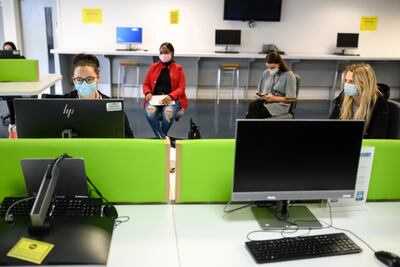The UK government is planning an evacuation-style operation to get university students home safely for Christmas.
The mass exodus of perhaps a million students will take place between December 3 and December 9 after England’s four-week lockdown ends.
Increased numbers of international students are expected to stay in the UK over Christmas regardless of the plans.
But the government said the six-day window to get home will be a welcome relief for most students who have had a “really difficult term” under strict coronavirus rules.
Students frequently complained about being unable to leave their halls of residence and socialise as universities grapple to control on-campus outbreaks.
Under the government’s plans, a voluntary, rapid Covid-19 test will be offered to as many students as possible before they depart.
If they test positive, the government said they will still have time to self-isolate and get home for Christmas.
The testing will be focused on high-risk areas, while departures will be staggered.
Students are strongly encouraged to select a date to return home.
The government will also instruct universities to move classes online by December 9 so students can have the option of studying from home.
Universities minister Michelle Donelan acknowledged that many international students would choose to remain in the UK over Christmas given the potential difficulties of getting back.
She told Sky News: “We expect universities to produce a plan – a bespoke plan for those students – including well-being support.

“They should make sure the festive season is as good as it possibly can be. This has been a really difficult year for us all, and especially students.”
Mohammed Fakhri, president of Glasgow University’s Middle Eastern and North African Society, said the six-day window was too short.
The Iraqi-born student said an exam period between December 7 and December 18 clashed with the departure dates.
He told The National: "A lot of students have to cope with the stress of having to do their online exams from abroad and trying to stay in with all the regulations as they leave the country and return home.
“It is becoming even harder for students to go back.”
International students previously vented their frustration at how universities had handled the crisis. This video gets their thoughts on adjusting to academic life abroad under the shadow of Covid.
Asked if tuition fees should be refunded, Ms Donelan said it was a responsibility for universities.
“What we’ve said is a strong message: if they want to continue charging that, they have to ensure the quality is there, the quantity is there, and it’s accessible,” she said.
“[Students] should make a complaint to their university, which could potentially lead to a refund.”
Ms Donelan said the government’s focus was on the departures but declined to detail plans for the students’ return in January – other than to say the government would be “prioritising testing”.
She insisted the UK’s public transport network had enough capacity to cope with the student travel window.
However, Universities and College Union general secretary Jo Grady said there were many unanswered questions.
She told BBC Radio 4's Today programme: "It's welcome, but there are so many logistical challenges and questions now.
“What about the return of students? We cannot be asked to repeat this in January … we need learning to go online immediately.”
Universities have been told to work with transport providers and health agencies to co-ordinate the departures.
Meanwhile, the government is preparing to spend up to £40 billion ($53.1bn) – more than its entire budget for public order and safety – for its Operation Moonshot testing programme.
Public Health England has been given a £22bn boost to add capacity to laboratory testing, The Times reported.
The NHS has also issued another tender of £20bn for on-the-spot testing.
In the UK, another 20,412 people tested positive for Covid-19 on Tuesday. There were a further 532 deaths.










